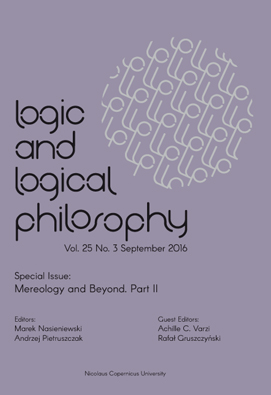Composition as identity and plural Cantor's theorem
DOI:
https://doi.org/10.12775/LLP.2016.009Słowa kluczowe
composition as identity, Cantor’s theorem, mereology, modal realism, necessitismAbstrakt
In this paper, I argue that the thesis of Composition as Identity blocks the plural version of Cantor’s Theorem, and that this in turn has implications for our use of Cantor’s theorem in metaphysics. As an example, I show how this result blocks a recent argument by Hawthorne and Uzquiano, and might be turned around to become an abductive argument for Composition as IdentityBibliografia
Baxter, D., and A. Cotnoir (eds.), 2014, Composition as Identity, Oxford University Press. DOI: 10.1093/acprof:oso/9780199669615.001.0001
Bohn, E.D., 2014, “Unrestricted composition as identity”, pages 143–165 in [Baxter and Cotnoir, 2014]. DOI: 10.1093/acprof:oso/9780199669615.003.0008
Bohn, E.D., 2011, “Commentary on Parts of Classes”, Humana.Mente, 19: 151–158.
Bohn, E.D., 2009, “Composition as identity”, PhD dissertation, UMass Amherst.
Bricker, P., forthcoming, “Composition as a kind of identity”, Inquiry.
Cameron, R., 2012, “Composition as identity doesn’t settle the special composition question”, Philosophy and Phenomenological Research, LXXXIV, 3: 531–554.
Cotnoir, A., 2013, “Composition as Generalized Identity”, pages 294–322 in Oxford Studies in Metaphysics, Vol. 8, K. Bennett and D.W. Zimmerman (eds.), Oxford University Press. DOI: 10.1093/acprof:oso/9780199682904.003.0007
Florio, S., 2014, “Untyped pluralism”, Mind, 123, 490: 317–337. DOI: 10.1093/mind/fzu069
Frege, G., 1884, The Foundations of Arithmetic, as translated by J.L.Austin, Blackwell, 1980.
Geach, P., 1967, “Identity”, Review of Metaphysics, 21, 3: 3–12.
Hawley, K., 2013, “Cut the pie anyway you like? Cotnoir on General Identity”, pages 294–322 in Oxford Studies in Metaphysics, Vol. 8, K. Bennett and D.W. Zimmerman (eds.), Oxford University Press. DOI: 10.1093/acprof:oso/9780199682904.003.0008
Hawthorne, J., and G. Uzquiano, 2011, “How many angels can dance on the point of a needle? Transcendental theology meets modal metaphysics”, Mind, 120, 477: 53–81. DOI: 10.1093/mind/fzr004
Hovda, P., 2014, “Logical considerations on composition as identity”, pages 192–221 in [Baxter and Cotnoir, 2014]. DOI: 10.1093/acprof:oso/9780199669615.003.0010
Klement, K.C., 2005, “Russell-Myhill paradox”, The Internet Encyclopedia of Philosophy, April 4, 2013. http://www.iep.utm.edu/par-rusm/
Lewis, D., 1991, Parts of Classes, Blackwell.
Lewis, D., 1986, On the Plurality of Worlds, Blackwell.
McDaniel, K., 2013, “Existence and number”, Analytic Philosophy, 54, 2: 209–228. DOI: 10.1111/phib.12013
McDaniel, K., 2010, “Composition as identity does not entail universalism”, Erkenntnis, 73, 1: 97–100. DOI: 10.1007/s10670-009-9207-5
Merricks, T., 2003, Objects and Persons, Oxford University Press. DOI: 10.1093/0199245363.001.0001
Nolan, D., 1996, “Recombination unbound”, Philosophical Studies, 84: 239–262. DOI: 10.1007/BF00354489
Oliver, A., and T. Smiley, 2013, Plural Logic, Oxford University Press. DOI: 10.1093/acprof:oso/9780199570423.001.0001
Rosen, G., 1995, “Armstrong on classes as states of affairs”, Australasian Journal of Philosophy, 73, 4: 613–625. DOI: 10.1080/00048409512346971
Saucedo, R., (ms), “Composition as identity and the number of things”.
Sider, T., 2007, “Parthood”, Philosophical Review, 116: 51–91. DOI: 10.1215/00318108-2006-022
Sider, T., 2014, “Consequences of collapse”, pages 211–221 in [Baxter and Cotnoir, 2014]. DOI: 10.1093/acprof:oso/9780199669615.003.0011
Wallace, M., 2011, “Composition as identity. Part 1 and 2”, Philosophy Compass, 6, 11: 804–827.
Wallace, M., 2009, “Composition as Identity”, PhD dissertation, University of North Carolina, Chapel Hill.
Williamson, T., 2013, Metaphysics as Modal Logic, Oxford University Press. DOI: 10.1093/acprof:oso/9780199552078.001.0001
van Inwagen, P., 1994, “Composition as identity”, Philosophical Perspectives, 8: 207–220. DOI: 10.2307/2214171
Yi, Byeong-Uk, 1999, “Is mereology ontologically innocent?” Philosophical Studies, 93, 2: 141–160.
Yi, Byeong-Uk, 2005, “The logic and meaning of plurals. Part I”, Journal of Philosophical Logic, 34, 5/6: 459–506. DOI: 10.1007/s10992-005-0560-9
Yi, Byeong-Uk, 2006, “The logic and meaning of plurals. Part II”, Journal of Philosophical Logic, 35, 3: 239–288. DOI: 10.1007/s10992-005-9015-6
Pobrania
Opublikowane
Jak cytować
Numer
Dział
Statystyki
Liczba wyświetleń i pobrań: 838
Liczba cytowań: 2







